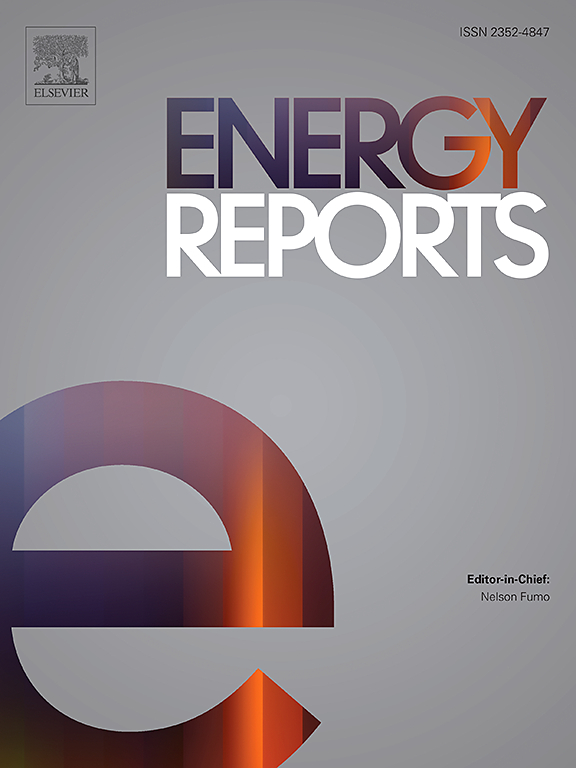基于拉丁超立方抽样的电力系统碳排放流概率计算
IF 5.1
3区 工程技术
Q2 ENERGY & FUELS
引用次数: 0
摘要
为了量化可再生能源不确定性对碳排放流(CEF)的影响,提出了一种基于拉丁超立方采样(LHS)的碳排放流概率计算方法。传统的蒙特卡罗模拟(MCS)方法通常与简单随机抽样(SRS)相结合,但这种方法在处理高维问题时效率较低,并且对输入随机变量分布空间的覆盖范围有限。为了解决这一问题,本文提出了一种结合LHS和Gram-Schmidt序列正交化(GS-LHS)的MCS方法。GS-LHS方法系统地分布样本点,使样本在多维空间中的分布更加均匀,而Gram-Schmidt序列正交化进一步提高了采样效率和覆盖率。基于所提出的方法,本文对IEEE 14总线和118总线系统进行了详细的分析,利用MATLAB进行仿真,计算了每个节点的节点碳强度(NCI)的概率分布。分析结果表明,该方法可以在较少的样本下提供更准确的NCI概率分布估计。在103个样本的IEEE118系统中,该方法的平均相对误差为0.1489 %(最大1.1458 %),而SRS方法的平均相对误差为0.2155 %(最大5.9098 %)。在误差阈值为1 %的情况下,GS-LHS方法的样本量和计算时间仅为SRS方法的46.52 %和47.17 %,总时间节省约45.36 %。这表明,该方法在估计输出随机变量分布方面优于SRS,同时保持了MCS的简单性和灵活性,减少了计算时间。本文章由计算机程序翻译,如有差异,请以英文原文为准。
Probabilistic carbon emission flow calculation of power system with Latin Hypercube Sampling
To quantify the impact of renewable energy uncertainty on carbon emission flow (CEF), this paper proposes a probabilistic CEF calculation method based on Latin Hypercube Sampling (LHS). Traditional Monte Carlo Simulation (MCS) methods typically combine with Simple Random Sampling (SRS), but such methods are less efficient in handling high-dimensional problems, with limited coverage of the input random variable distribution space. To address this issue, this paper introduces an MCS method combined with LHS and Gram-Schmidt sequence orthogonalization (GS-LHS). The GS-LHS method systematically distributes sample points, making the sample distribution more uniform in multi-dimensional space, while the Gram-Schmidt sequence orthogonalization further improves sampling efficiency and coverage. Based on the proposed method, this paper conducts a detailed analysis of the IEEE 14-bus and 118-bus systems, using MATLAB for simulation and calculating the probabilistic distribution of node carbon intensity (NCI) for each node. The analysis results show that the proposed method can provide more accurate NCI probability distribution estimates with fewer samples. In the IEEE118 system, with 103 samples, the proposed method's average relative error is 0.1489 % (max 1.1458 %), while SRS has an average of 0.2155 % (max 5.9098 %). The GS-LHS method requires only 46.52 % of the sample size and 47.17 % of the computation time of the SRS method at a 1 % error threshold, resulting in a total time saving of approximately 45.36 %. This shows that the proposed method surpasses SRS in estimating the distribution of output random variables, also maintains the simplicity and flexibility of MCS and reduce the computation time.
求助全文
通过发布文献求助,成功后即可免费获取论文全文。
去求助
来源期刊

Energy Reports
Energy-General Energy
CiteScore
8.20
自引率
13.50%
发文量
2608
审稿时长
38 days
期刊介绍:
Energy Reports is a new online multidisciplinary open access journal which focuses on publishing new research in the area of Energy with a rapid review and publication time. Energy Reports will be open to direct submissions and also to submissions from other Elsevier Energy journals, whose Editors have determined that Energy Reports would be a better fit.
 求助内容:
求助内容: 应助结果提醒方式:
应助结果提醒方式:


